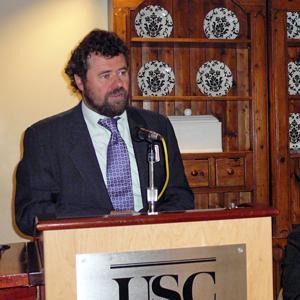By Liz Warden
Originally published by the Daily Trojan on Oct. 11, 2009
 |
| Voice of America photo of Cameron Kerry by Rong Yi. |
The USC US-China Institute is set to contribute to the bilateral discourse between the United States and China by hosting a delegation of high-level Chinese government officials for a daylong Legal Exchange focusing on Chinese telecommunications and patent law, on campus Monday.
The US-China Legal Exchange is an annual summit hosted in alternating years in the United States or China, that gives representatives from both countries an opportunity to clarify and discuss legal issues from their respective nations. This year, the USC US-China Institute will host the Los Angeles portion of the exchange at the Davidson Conference Center.
“The most important part of the Legal Exchange is that it promotes dialogue and provides an opportunity for direct contact between legal and academic communities with foreign government officials,” said Joel Blank, senior attorney for the Office of the Chief Counsel for International Commerce, who is involved in organizing the exchange.
The Chinese delegation, led by Vice Minister Zhang Qiong from China’s State Council Legislative Affairs Office, will use this year’s exchange to focus on amendments to the Chinese patent law and explain the details of the draft of the Chinese telecommunications law for American service providers and manufacturers who are interested in the Chinese market.
“They are trying to structure this in a way they can attract foreign technology, investment, cooperation and build their own
 |
| Zhang Qiong 张穹, Vice Minister of Commerce, speaking at USC on Oct. 12, 2009. |
capacity for their domestic market,” said Clayton Dube, associate director of the USC US-China Institute.
Dube added that the event was an opportunity for people from both countries to clarify and learn more about the legal technicalities of their individual legal systems, rather than approach the markets without any knowledge.
“This is not intended to be a debate,” Dube said. “The reason the [Chinese] Ministry of Commerce and US Department of Commerce is putting to this together is because they want greater discussion and understanding.”
The US Department of Commerce asked the institute to be a co-host for the Legal Exchange, in part because of its research which focus on trends that could affect the US-China relationship, rather than generally topical issues, according to Dube.
“We invite people here, send people there, and that kind of back and forth is essential,” Dube said. “If you are only talking about other people, you can get a lot of things wrong. Talking [directly] with people can really help you understand them.”
Blank added that he had identified the institute as an entity in the Los Angeles area with expertise in US-China relations that would also be a good place to hold an event like the Exchange.
“They will help draw experts to the program that are in the academic and non-academic community,” Blank said.
He added that the attendance by the institute’s faculty and students would be beneficial because they can bring their own expertise to the program as well.
The event will feature a number of experts, ranging from lawyers, academic professors and even company representatives to comment on Chinese law and American involvement in the Chinese market, including USC professor Simon Wilkie, an expert on cable, Internet and wireless communications.
According to Dube, the Exchange is just one of the ways the Institute adds to the national conversation about the bilateral relationship between the two countries, he said. Events like this offer students and faculty a different way of approaching their research.
Ying Jia Huang, a senior majoring in international relations and history who is a student assistant at the Institute, said events like the Exchange provides an opportunity to learn much more about the two countries’ policies than she would have sitting in a classroom.
“You get to meet people who put the policies together, wrote these books, write these articles we read on JSTOR,” Huang said. “The degree of relevance is much more significant than reading through textbooks.”
Following the Exchange in Los Angeles, the Chinese delegation will travel to Chicago and New York City, where they will present more information on the Chinese legal system to local businesses and legal and academic communities.
***
Presentations and downloadable documents are available at the event page:
http://china.usc.edu/ShowEvent.aspx?EventID=1077
One of the panels at the exchange. From left, Andrei Iancu, Elizabeth Chien-Hale, Alex Nie, Yuan Jie, and Jin Wuwei.
One of the presenters, Alex Nie of Foley & Lardner, speaking to reporters at the exchange.




